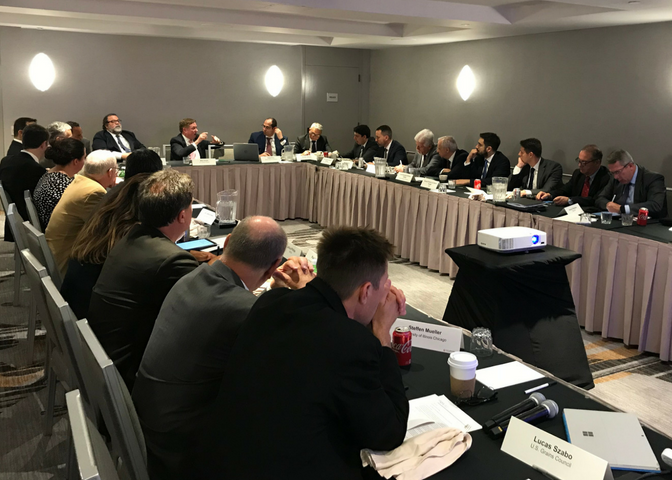Representatives from the Brazilian Ministry of Petroleum, Natural Gas and Biofuels (ANP) and the Brazilian biofuels industry discussed the development and implementation of RenovaBio, Brazil’s new biofuels policy, during meetings in Washington, D.C., this week with the U.S. Grains Council (USGC), the Renewable Fuels Association (RFA), Growth Energy and the U.S. Department of Agriculture (USDA).
The RenovaBio program aims to reduce carbon emissions in Brazil’s transportation fuel sector by 10 percent over a 10-year span using biofuels. The policy is set for implementation as soon as 2020 and would potentially increase the total size of Brazil’s ethanol market to nearly 10.5 billion gallons by 2028, from almost seven billion gallons currently.
“We applaud the Brazilian government and industry in their desire to set an example for environmental preservation by increasing the use of ethanol,” said Mike Dwyer, USGC chief economist and lead on ethanol market development. “We look forward to continuing to work together to ensure RenovaBio is a fair, accurate and successful policy.”
The Brazilian and U.S. delegations specifically discussed points of obligation and compliance, with former U.S. Environmental Protection Agency (EPA) officials providing perspective on implementation of U.S. biofuels policy. The Council also stressed the importance of a policy based on science versus the inadvertent creation of a non-tariff trade barrier.
“The discussion emphasized the importance of transparent, science-based approaches to biofuels policy in addition to the inclusion of a role for trade,” Dwyer said. “These meetings continue our collaborative partnership re-emphasizing the potential implications of the RenovaBio program for ethanol trade between the United States and Brazil.”
The meeting was part of a larger engagement by the Council on the RenovaBio program. These efforts include reviewing the calculation methods for greenhouse gas (GHG) emission reductions and monitoring how U.S. corn-based ethanol compares to Brazilian sugarcane-based and corn-based ethanol.
In the 2016/2017 marketing year, Brazil and the United States represented both the two largest producers and the two largest consumers of ethanol globally. Each country remained the other’s largest trading partner, despite the Brazilian government’s imposition of a new tariff rate quota (TRQ) on ethanol. The meetings in Washington, D.C, reiterated the potential for even more trade between the United States and Brazil should the TRQ be abolished with the implementation of the RenovaBio program.
Brazil applied a 20 percent tariff in September 2017 on all imports of ethanol after a 600 million liter (158.5 million gallon) TRQ. Even with the full tariff applied, the United States shipped 103 million gallons of ethanol to Brazil in the month of February 2018 – the most ethanol exports to Brazil in a single month. Overall, Brazil has imported nearly 410 million gallons of U.S. ethanol in the first eight months of this marketing year (September 2017-April 2018).
Learn more about the Council’s work in Brazil here.
About The U.S. Grains Council
The U.S. Grains Council develops export markets for U.S. barley, corn, sorghum and related products including distiller’s dried grains with solubles (DDGS) and ethanol. With full-time presence in 28 locations, the Council operates programs in more than 50 countries and the European Union. The Council believes exports are vital to global economic development and to U.S. agriculture’s profitability. Detailed information about the Council and its programs is online at www.grains.org.

